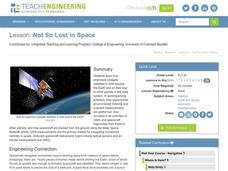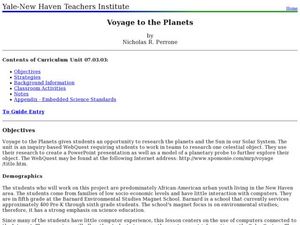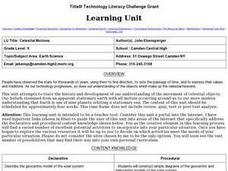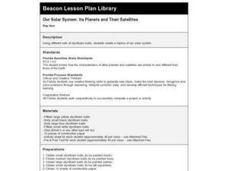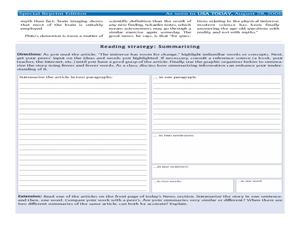Curated OER
Not So Lost in Space
Students investigate how engineers navigate satellites in orbit around the Earth and on their way to other planets in the solar system. They study vocabulary words and participate in studying a satellite by learning about times and...
Curated OER
Voyage to the Planets
Students examine the planets in the solar system. In this planetatry lesson students complete a project using a WebQuest program.
Curated OER
Celestial Motions
Ninth graders complete a unit of lessons on the history of our knowledge of celestial objects. They conduct Internet research, plot the motion of a planet, construct a model of the sun's apparent motions, and create diagrams of the solar...
Curated OER
GED Vocabulary: Earth and Space Science-Earth's Crust and The Solar System
In this earth and space science worksheet, students complete a crossword puzzle given 9 clues and a word bank on topics such as sea floor spreading, tectonic plates, faults, lava and the big bang theory.
Space Awareness
Making A Sundial
Can people really measure time just by using the sun? Scholars venture outside on a nice, sunny day to build sundials and learn how people measured time 600 years ago. The class builds two different sundials while gaining practice with...
Ventura County Air Pollution Control District
Effects of Global Warming
Your learners have probably heard of climate change, but do they really understand what it is? Study the history, details, and future implications of global warming and the greenhouse effect with a set of activities designed for an...
American Museum of Natural History
Moon Flip Book
Flip over the phases of the moon. Using an interactive, pupils view the location of the moon relative to the sun and earth for the eight major phases of the moon. Individuals record how the moon looks through a complete cycle. Using...
Curated OER
Dimensions of the Solar System
A set of instructions that help learners draw concentric orbital arcs to scale of each planet. There is a table to complete with data and questions to check understanding of realistic orbits and relative sizes.
NASA
Things Are Not Always What They Seem
Science is magic that works. Magical color-changing beads and a coffee can that follows voice commands are just two examples of magic tricks that rely on science. After completing a hands-on activity and an experiment investigating the...
Curated OER
The Solar System
In this crossword puzzle learning exercise, students read the 20 clues about the solar system. Students then complete the puzzle with 20 words related to the solar system.
Curated OER
Let's Build a City In the Solar System
Sixth graders explore the solar system. Using the Internet, 6th graders gather information about planets in our solar system. Students participate in an activity to determine where they should build the first city in space. They create a...
Curated OER
Our Solar System: Its Planets and Their Satellites
Fourth graders create a replica of our solar system. Each group arranges the balls in the proper order for our solar system by gluing them to the construction paper. Under each of the balls, the name of the object should be clearly printed.
Curated OER
Solar System
Students create and present PowerPoint presentations on certain aspects of our Solar System. The Nettrekker search engine is used for researching the information. Students can then add music and graphics to enhance their presentations.
Curated OER
You Are Here
Students determine the relative size and distance of the planets in the solar system. They use ratios in their mathematical calculations to make models of the planets after discussing the relative sizes of the planets. They keep a...
Curated OER
Solar System Fun Facts
Students read facts about the Solar System. In this solar system lesson plan, students read facts on the dimensions, planets, and workings of the solar system. There is a big emphasis on Saturn.
PBS
Why Isn't There an Eclipse Every Month?
Searching for an eclipse activity that sends scholars over the moon? Try an interesting interactive to get their minds active! The resource, part of an extensive Space series from PBS Learning Media, uses modeling and data analysis to...
Laboratory for Atmospheric and Space Physics
Orbit Simulator
Researchers think they have evidence of a new planet deep in our solar system that is the size of Neptune and orbits the sun far beyond Pluto. The orbit simulator shows the orbits of our well-known planets, as well as Pluto and the comet...
Curated OER
The Building Blocks
This PowerPoint is a comprehensive review of all the facts related to an atom's basic structure and function. What makes this unique is that it is geared toward an audience of junior geologists. After introducing the periodic table of...
Curated OER
Solar System
In this Solar System worksheet, students are quizzed. Students answer questions about the solar system and the planets and other celestial bodies that comprise it.
Curated OER
The Earth-Sun-Moon System
Third graders construct a model of the earth-sun-moon system using students as the sun, moon, and earth. They discuss ways that time is related to the movement of the earth and moon.
Curated OER
Physical Science: Solar Energy
Pupils review and discuss how Solar energy and electricity produce light and heat. They create a photo/picture journal and include pictures taken during solar energy activities to a PowerPoint slide presentation.
Curated OER
Astronomy and Me: Moons Over New Haven
Third graders study the features of different moons orbiting the planets. In this astronomy lesson, 3rd graders explore the different phases of the moon using an interactive online website. They compare and contrast the features of the...
Curated OER
The Universe Has Room for Change
In this universe and change worksheet, students read about the demotion of Pluto as one of the 9 planets as well as other changes in science. Students summarize their reading and identify unfamiliar words in the article. Students...
Curated OER
Earth Science: The Sun-Earth Relationship
Students examine the sun's impact on the Earth. They read online articles, explore various websites, and answer questions using information found on the Internet.


